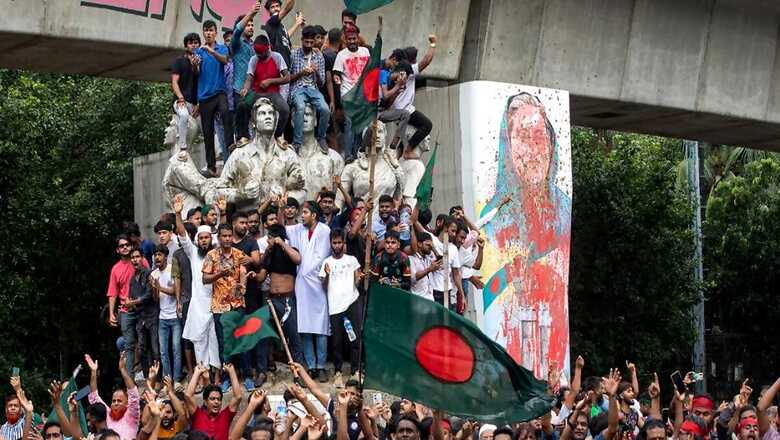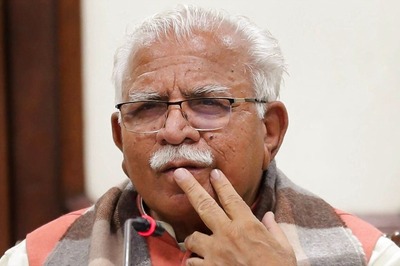
views
Bangladesh is on the brink of a civil war, thanks to the meddling in its internal affairs by the United States. This meddling was evident in the run-up to the January 2024 general elections which resulted in another term for Sheikh Hasina and her party Awami League.
The US and many Western countries had termed these polls ‘unfair’ as it failed to unseat Hasina. The Western world has been backing the main Opposition Bangladesh Nationalist Party (BNP) and its ally Jamaat-e-Islami Bangladesh which has close links with Pakistan’s security establishment and is known for using violence as a primary tool to subjugate minorities and its opponents.
The US has been a significant player in Bangladesh because of Bangladesh’s strategic location. Ironically, it had played a key role in brokering a settlement in 2007 between the BNP and the Awami League. This resulted in the stepping down of the BNP-led government and the eventual rise of Sheikh Hasina to power in 2009.
One of the key reasons that had upset the Americans was that Hasina refused to get influenced by the US. There were enough indications since 2014 that the US wanted to oust Hasina. It had expressed “disappointment” and “concern” about the election results after the 2014 and 2018 polls also after Hasina won.
US-China Clash
Hasina’s ouster, it appears, is an outcome of the US-China conflict. The US is the largest foreign investor in Bangladesh. It is also the third largest trading partner of Bangladesh. The biggest market for Bangladesh’s ready-made garments is the US. It is also the biggest investor in Bangladesh’s energy sector.
The growing Chinese investments in infrastructure projects had become a cause of deep concern for Washington. It was seen as Dhaka’s tilt towards Beijing.
It is important to understand that Bangladesh’s geographical location makes it a significant player in the Indo-Pacific region. Both China and the US have been competing to have greater influence in this region.
The US had invited Dhaka to join the Quad in 2020. It also wanted Bangladesh to be part of its Indo-Pacific Strategy (IPS) established in early 2022. However, Dhaka refused to join any military alliance like Quad.
Hasina had also rebuffed China in 2021 when the then Chinese envoy had warned Bangladesh from joining any military alliance as it would lead to “substantial damage” to (Sino-Bangladeshi) bilateral relations. Dhaka curtly responded, “We decide our own foreign policy”.
These incidents point towards the fact that Hasina wanted to pursue an independent foreign policy and keep a balance between the US and China as well as between China and India. The US, it appears, took a strong exception to this approach of the Awami League government and started brewing trouble.
In 2021, the US imposed sanctions on Bangladesh’s elite paramilitary force; the Rapid Action Battalion (RAB) and seven of its current and former members charging them of extra-judicial killings and disappearances.
In December 2022, US Ambassador to Bangladesh Peter Haas visited homes and met families of victims of allegedly enforced disappearances, including the house of BNP leader Sajedul Islam Sumon. Haas’s actions triggered a strong reaction from Awami League leaders. They accused the US envoy of supporting the BNP and interfering in their country’s domestic affairs. Further, Bangladesh was not invited by the US to its Democracy Summits in December 2021 and March 2023.
In April 2023, Hasina had accused the US of seeking a regime change in Bangladesh, calling it an “undemocratic action”, whereby “they (the US) are trying to eliminate democracy and introduce a government that will not have a democratic existence.” Bangladesh officials hit back at the US pointing to weakness in America’s democracy and calling America “a bunch of hypocrites”. The Awami League government had clearly indicated that it was not inclined to get a lecture from the US on democracy.
The US responded curtly to these remarks by the Bangladesh government. During Bangladesh PM’s trip to Washington DC at the end of April 2023 to celebrate 50 years of partnership with the World Bank, none of President Biden’s administration officials met her.
Return of Jamaat-e-Islami
The current violence and anarchy in Bangladesh also marks the return of Jamaat-e-Islami which has grave implications not only for Bangladesh but also for India and other countries in the region. Jammat was banned as a political party by the Bangladesh Supreme Court in 2013. On August 1 this year, the Hasina government had officially banned Jamaat-e-Islami and its student wing, Chhatra Shibir, designating them as terrorist organisations. Jamaat is an ultra-radical outfit that swears to bring sharia laws and make Bangladesh a radical Islamist country. It is a blatantly anti-Hindu outfit and is known to have repeatedly targeted Hindus in Bangladesh.
The US-backed Jamaat to counter Hasina. It had put pressure on Hasina to allow it to contest the January 2024 general elections. Hasina had dealt with Jamaat strongly but now in her absence, the Jamaat cadres are leading violent mobs and instigating them to target minorities (primarily Hindus) as well as the Awami League cadres.
This is similar to what the US had done in Afghanistan where it backed radical Islamists to overthrow the governments that failed to toe its line. Taliban and Haqqani network, the fountainhead of global terrorism is an outcome of the US backing the radical Islamists in Afghanistan with the help of Pakistan’s security establishment.
Today the whole world, including the US and the West, is suffering the menace of Islamic radicalisation and terrorism, courtesy of the American policy of removing and replacing governments that want to pursue an independent foreign policy in their own national interest. In Bangladesh also, a radical Islamist government is in the offing.
The writer is an author and columnist and has written several books. His X handle is @ArunAnandLive. Views expressed in the above piece are personal and solely those of the author. They do not necessarily reflect News18’s views.















Comments
0 comment